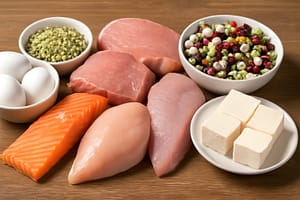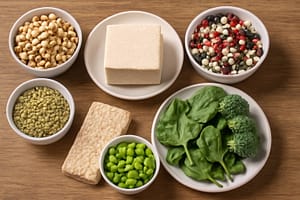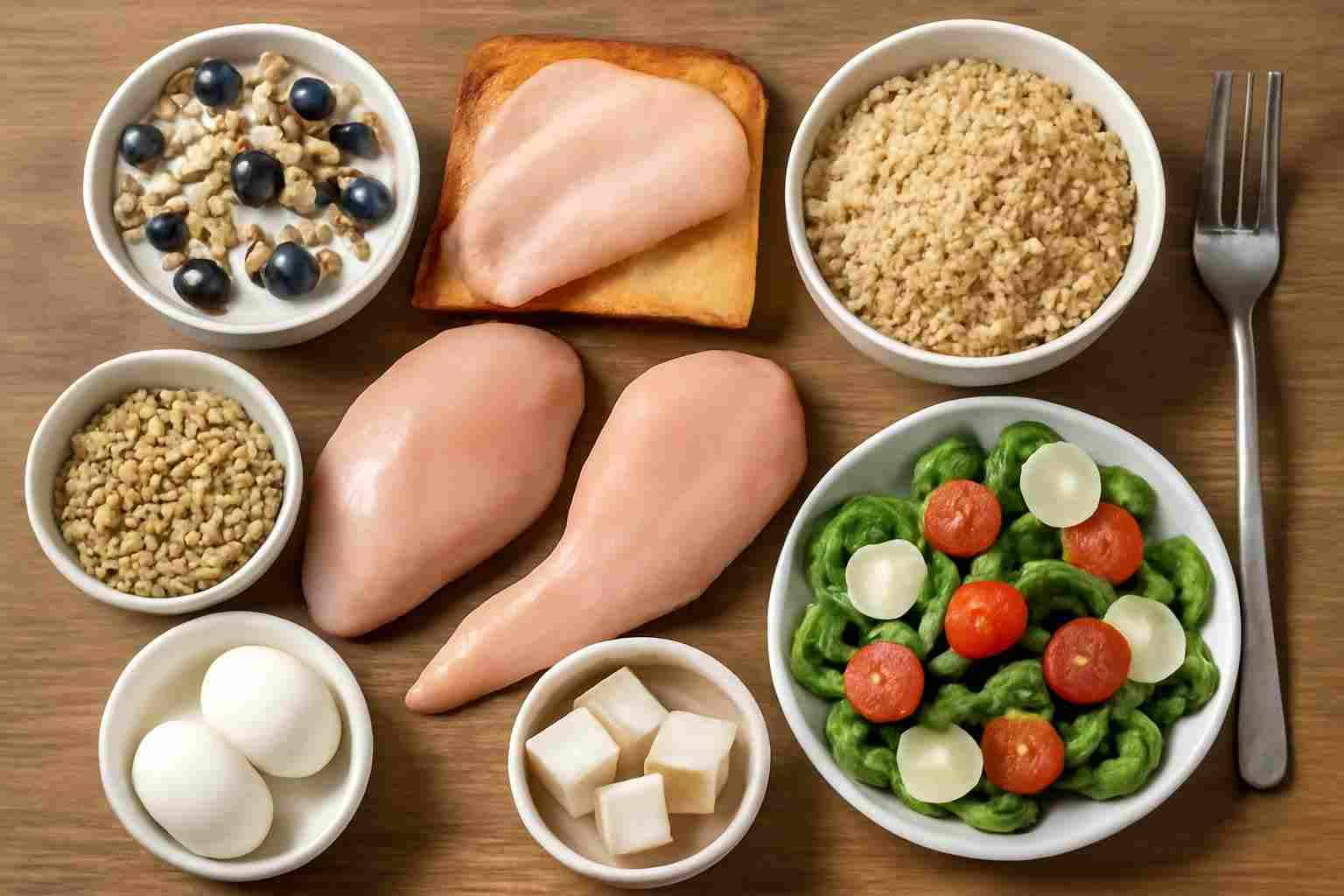Introduction to Lean Proteins
Lean proteins are those that contain a low amount of fat compared to their protein content. These are considered essential for maintaining a balanced diet, as they provide the amino acids necessary for proper body function, without the excess fat associated with other protein sources. This group includes foods such as chicken, turkey, fish, legumes, and some dairy products. Incorporating these proteins into your daily diet not only contributes to proper muscle development but can also help maintain a healthy weight and improve overall well-being.
The role of lean proteins in a healthy diet lies in their ability to provide energy, promote satiety, and facilitate muscle recovery after exercise. Unlike proteins from fattier sources, lean options provide the benefits of protein without the potential risk of increased cholesterol or other problems associated with a high intake of saturated fat. By including lean protein sources in daily meals, it is possible to achieve an optimal balance that supports both physical and mental health.
Throughout this article, we will explore various aspects of lean proteins: their health benefits, recommendations on how to effectively integrate them into different meals, and recipe examples that can facilitate their incorporation. We will also discuss how these proteins can contribute to the prevention of chronic diseases and improve the overall quality of the diet. In short, lean proteins are not only an essential component of nutrition but also a key element in the pursuit of a healthy lifestyle.

Benefits of Including Lean Proteins in Your Diet
Incorporating lean protein into your daily diet offers several important health benefits. One of the most notable aspects is its role in weight management. Lean proteins, such as chicken, turkey, fish, and legumes, are low in saturated fat. Consuming these foods promotes greater feelings of satiety, which can help reduce overall calorie intake. A study published in the American Journal of Clinical Nutrition indicates that a diet high in lean protein can be effective in weight loss and maintenance, providing a solid foundation for a balanced diet.
Furthermore, lean proteins are essential for cardiovascular health. They contain nutrients that help maintain optimal cholesterol and triglyceride levels. For example, fish, particularly those rich in omega-3 fatty acids, such as salmon, have been shown to have positive effects on reducing heart disease. Regular intake of lean proteins is also associated with lower blood pressure and a better lipid profile, according to several epidemiological studies.
On the other hand, lean proteins play a crucial role in muscle development and recovery. As we age, muscle mass tends to decrease, and adequate intake of lean proteins can help combat this phenomenon. Research indicates that higher protein intake promotes muscle protein synthesis, which is crucial for muscle regeneration and growth. Athletes and those who participate in regular physical activity often benefit from a diet rich in lean proteins to optimize their performance and facilitate post-workout recovery.
In short, the benefits of including lean proteins in your diet are numerous, from weight control to improved cardiovascular health and muscle development. Adopting a diet that includes these foods is a vital step toward a healthier life.

Weight Control and Lean Proteins
Incorporating lean proteins into your diet plays a crucial role in weight management. These proteins, found in sources such as chicken, turkey, fish, and legumes, offer a number of benefits that promote effective body weight management. One of the most notable characteristics of lean proteins is their ability to increase satiety. By consuming protein-rich foods, the body feels more satisfied for a longer period of time, leading to a reduction in total caloric intake throughout the day.
This increased feeling of satiety is due to the fact that lean proteins take longer to digest compared to carbohydrates. As a result, hormones that stimulate hunger are inhibited, which can be essential for those looking to lose weight. Furthermore, diets rich in protein have been shown to have a positive effect on metabolism. This is because the body requires more energy to process these proteins, a phenomenon known as the thermic effect of food. Consequently, people who consume an adequate amount of lean protein may experience increased calorie burning even at rest, thus contributing to weight management.
Finally, adequate lean protein intake is not only effective for weight loss but also plays an important role in preventing obesity. Regularly including these proteins in the diet, combined with an active lifestyle, can help maintain a healthy body weight and reduce the risk of weight-related diseases. Thus, lean protein becomes a valuable tool for those seeking to balance their nutrition and effectively manage their weight.

Heart Health and Lean Proteins
Lean proteins play a crucial role in cardiovascular health, making them a fundamental choice for those who want to improve their overall well-being. Including these protein sources in your diet can significantly contribute to reducing the risks associated with heart disease. Lean proteins, which include options like skinless chicken, fish, beans, and legumes, are low in saturated fat and calories, helping you maintain a healthy weight.
Lean protein consumption is linked to cholesterol management. Diets rich in these proteins can help lower LDL cholesterol (the "bad" cholesterol) levels, thus improving the body's overall lipid profile. Additionally, some types of fish, such as salmon and mackerel, are also excellent sources of omega-3 fatty acids, known for their anti-inflammatory properties and for helping to lower blood pressure, another important factor in heart health.
On the other hand, lean proteins help provide satiety, which can be beneficial for controlling appetite and avoiding overconsumption of unhealthy foods. This is especially relevant in preventing obesity, a significant risk factor for cardiovascular disease. Incorporating a variety of lean protein sources into a balanced diet not only improves heart health but also offers individuals the opportunity to enjoy a wide range of essential nutrients that support a healthy lifestyle.
In short, choosing lean proteins in your daily diet can be a decisive factor in keeping your heart healthy and preventing cardiovascular disease. The correct selection and combination of these protein-rich foods is key to promoting a long and healthy life.
Muscle Building and Recovery
Lean proteins play a fundamental role in developing and maintaining muscle mass, especially for those who exercise regularly. These proteins, which include options like chicken, turkey, fish, and some legumes, are essential for muscle protein synthesis, a process that is critical for both muscle growth and repair after exercise. When muscles are subjected to stress, such as during resistance training or high-intensity exercise, micro-injuries arise. Lean proteins help repair these injuries, facilitating the rebuilding of muscle fibers.
Additionally, consuming an adequate amount of lean protein post-workout is vital to maximizing recovery. Studies have shown that consuming protein within 30 minutes to two hours after physical activity can significantly boost muscle protein synthesis. During this time window, the body is in an anabolic state, which favors the utilization of amino acids for recovery, making investing in a diet rich in lean protein indispensable for athletes and fitness enthusiasts.
For athletes, the recommended intake ranges from 1.2 to 2.0 grams of protein per kilogram of body weight, depending on training intensity. This means that a 70 kg athlete might need between 84 and 140 grams of lean protein per day. Incorporating lean protein into every meal, along with carbohydrates and healthy fats, contributes to a balanced diet that not only supports muscle development but also overall performance. It is therefore essential not to underestimate the importance of these proteins in muscle recovery and growth.
Lean Animal Protein Sources
Lean proteins are essential for a healthy diet, and their consumption can offer multiple health benefits, including maintaining muscle mass and promoting satiety. Among the main sources of lean animal protein, three foods stand out as particularly nutritious: chicken breast, fish, and lean meats.
Chicken breast is widely recognized for its low fat content and rich protein profile. A 100-gram serving of skinless chicken breast provides approximately 31 grams of protein and only 3.6 grams of fat. This food is versatile and can be prepared in a variety of ways, such as grilled, baked, or in stews. To maximize its nutritional value, it is recommended to stew it with fresh herbs and vegetables, avoiding heavy sauces that add unnecessary calories.
Fish is another excellent source of lean protein. Varieties such as salmon, tuna, and trout are not only high in protein but also provide omega-3 fatty acids, which are essential for cardiovascular health. For example, 100 grams of salmon provides around 25 grams of protein and important benefits for heart health. Steaming, baking, or grilling fish with a touch of lemon and herbs can enhance both its nutritional profile and flavor.
Finally, lean meats like pork and beef should also be considered. Lean cuts like pork loin or beef tenderloin provide approximately 20-24 grams of protein per 100 grams. When choosing these options, it's advisable to remove visible fat before cooking and opt for healthy preparation methods, such as roasting or steaming, to maintain their nutritional value.

Lean Plant-Based Protein Sources
Lean plant-based proteins are an excellent option for those looking to incorporate protein into their diet without excessive saturated fat consumption. Prominent sources include legumes, tofu, and quinoa. Each of these options not only provides a significant protein profile but also offers additional benefits that contribute to a balanced diet.
Legumes, which include beans, lentils, and chickpeas, are nutrient-dense and high in fiber. This fiber not only aids digestion but can also help keep you feeling fuller longer, which is beneficial for weight management. Including legumes in salads, stews, or even as a base for veggie burgers are some effective ways to enjoy them in your diet.
Tofu, made from soybeans, is another versatile source of lean protein. In addition to being low in calories, tofu is rich in calcium and can be used in a variety of dishes, from stir-fries to soups. Its ability to absorb flavors makes it an excellent ingredient in cooking, allowing you to create delicious recipes such as tofu tacos or vegetable curries.
Finally, quinoa is a pseudocereal known for its high protein content and optimal amino acid profile. As a complete food, quinoa can serve as an excellent addition to salads, side dishes, or even as the basis for a nutritious breakfast. With its fluffy texture and light flavor, quinoa can be combined with a variety of ingredients, making it ideal for a diverse diet.
Incorporating these lean plant-based protein sources into your diet not only provides nutritional benefits but also contributes to a variety of flavors and textures in everyday dishes.
Tips for Incorporating Lean Proteins into Your Daily Diet
Incorporating lean proteins into your daily diet is not only crucial for maintaining good health, but it can also be very practical and affordable. One of the most effective strategies is planning meals in advance. This involves taking the time to create a weekly menu that includes lean proteins such as chicken, turkey, fish, eggs, and legumes in every meal. Making a shopping list based on this menu makes it easier to acquire the necessary ingredients, which in turn minimizes the likelihood of impulsively opting for less healthy options.
Adding lean protein isn't limited to just main meals. It's also essential to consider healthy snacks throughout the day. For example, blending plain Greek yogurt with fruit or nuts can be a delicious option; additionally, protein shakes that include spinach, bananas, and protein powder are ideal for an energy boost. These snacks not only increase lean protein intake but also help balance other macronutrients like fats and carbohydrates.
When it comes to balancing protein intake with other macronutrients, it's important to do so consciously. Make sure to combine a lean protein source with complex carbohydrates, such as quinoa or brown rice, and healthy fats, such as avocados or olives. This not only optimizes the nutritional value of each meal but also contributes to greater satiety, which can aid in weight management. Remember that not all protein sources are created equal; prioritize lean options to maximize long-term health benefits.
Conclusion
In short, including lean protein in your diet is essential for maintaining optimal health and promoting a balanced lifestyle. Throughout this article, we've highlighted how these protein sources not only contribute to muscle development and repair but also aid in regulating body weight and improving metabolism. Foods rich in lean protein, such as chicken, turkey, fish, and legumes, offer nutritious alternatives that are low in fat, making them an ideal choice for those looking to improve their diet.
Furthermore, the importance of choosing lean proteins as part of a varied and balanced diet has been emphasized. Adequate intake of these proteins can reduce the risk of chronic diseases, such as type 2 diabetes and cardiovascular disease. Incorporating these dietary choices into your daily routine can be a significant step toward overall well-being and maintaining a healthy weight.
Finally, readers are encouraged to consider including more lean proteins in their menus. Not only will they benefit from their nutritional properties, but they will also foster eating habits that promote a healthier future. Adopting a diet that prioritizes foods rich in lean protein will translate into long-term benefits, both in physical health and overall well-being. Investing in our diet is investing in our health, and lean proteins are a key piece of this well-balanced puzzle.
Maybe you might like: How to Make Craft Beer
Credit Images: OpenAi










